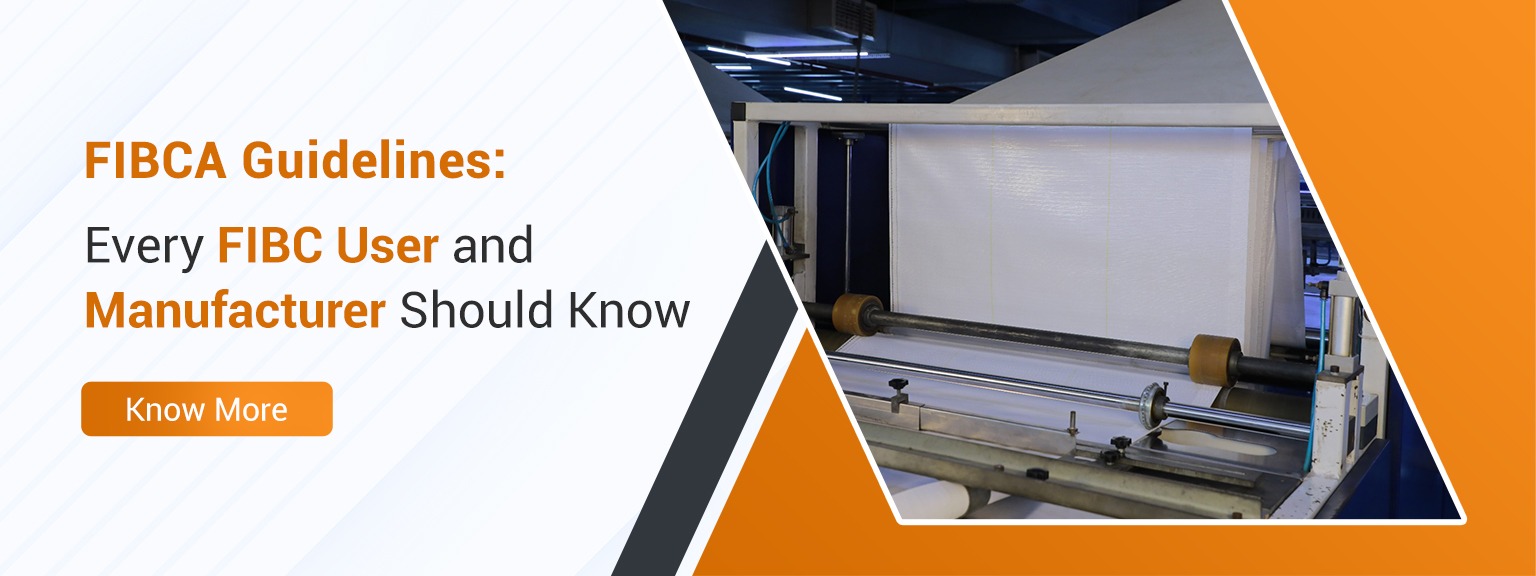The Flexible Intermediate Bulk Container Association (FIBCA) plays a crucial role in ensuring the safe handling, storage, and transportation of Flexible Intermediate Bulk Containers (FIBCs), commonly referred to as bulk bags. Whether you are a manufacturer, exporter, or end-user, following these guidelines is essential to protect personnel, maintain product integrity, and improve operational efficiency.
As one of India’s largest FIBC manufacturers and exporters, Mittal Technopack strongly adheres to FIBCA guidelines to deliver safe, reliable, and high-quality bulk packaging solutions worldwide.
FIBCA Guideline
1. Pre-Use Inspection
Before filling or lifting a bulk bag, always check for signs of wear and damage.
- Inspect for cuts, tears, abrasions, or broken lifting loops.
- Do not use damaged FIBCs under any circumstances.
- Verify that the label and safe working load (SWL) are clearly visible.
A quick inspection reduces the risk of accidents and ensures compliance with safety standards.
2. Filling and Emptying Practices
Proper filling and emptying are essential to maintain safety and product quality.
- Follow manufacturer’s instructions for securing fill and discharge spouts.
- Avoid overfilling—always stay within the safe working load.
- Ensure a stable and even flow during discharge to prevent bag instability.
3. Safe Lifting & Suspension
Incorrect lifting practices are one of the main causes of FIBC damage and workplace accidents.
- Always use all lifting loops or sleeves provided by the manufacturer.
- Never gather loops together on a single hook unless designed for it.
- Keep all personnel clear when a bag is suspended.
- Never stand beneath or near a hanging FIBC.
4. Handling Equipment Safety
FIBCs should only be moved with the correct equipment:
- Use forklift tines, crane hooks, or spreader bars that are smooth and free of sharp edges.
- Never drag or push a bulk bag on the ground.
- Ensure equipment is suitable for the weight and type of FIBC being handled.
5. Static Electricity Protection
Static charges can be extremely hazardous, especially in flammable or explosive environments.
- Use the correct type of FIBC:
- Type A: Standard (non-static protective).
- Type B: For dry, flammable powders (not for explosive atmospheres).
- Type C: Conductive, requires grounding.
- Type D: Static-dissipative, no grounding required.
- For Type C bags, always maintain a proper grounding connection throughout filling and emptying.
- Stop operations if grounding is interrupted until charges have fully dissipated.
6. Forklift Handling Guidelines
When using forklifts:
- Keep the FIBC close to the mast and low to the ground while moving.
- Tilt the mast back slightly for stability.
- Maintain a clear line of sight at all times.
- Avoid sudden movements that can damage the bag or cause spills.
7. Recycling and Sustainability
FIBCA promotes environmentally responsible practices, including recycling.
- Recycle bulk bags at the end of their life cycle through certified programs.
- Member companies of FIBCA provide recycling support and solutions.
- Encourage reuse only when FIBCs are specifically designed for multiple trips and properly cleaned.
8. Manufacturer & Supplier Recommendations
While FIBCA provides universal guidelines, each manufacturer or supplier may have additional recommendations based on material type, bag design, and application.
- Always follow the printed instructions and warnings on the FIBC label.
- Consult with suppliers for product-specific handling instructions.
Why Choose Mittal Technopack?
With over 40 years of industry expertise, Mittal Technopack has become a trusted name in the global packaging industry. As one of the largest manufacturers and exporters of FIBC bags in India, Mittal Technopack ensures that every product is designed and manufactured in strict compliance with FIBCA guidelines.
Why Customer Love Mittal Technopack Worldwide:
- Global Recognition: Supplying FIBC bags to leading industries worldwide.
- Quality Assurance: Each bag is manufactured with advanced technology and tested to meet international safety standards.
- Sustainability Commitment: Offering eco-friendly and recyclable packaging solutions.
- Customization Options: Wide range of FIBC types (Type A, B, C, and D) tailored for diverse industries.
- Trusted Legacy: Established in 1985, Mittal Technopack has built decades of trust, innovation, and excellence.
By choosing Mittal Technopack, you not only get reliable FIBC solutions but also the assurance of working with a brand committed to safety, quality, and sustainability.
Conclusion
Following FIBCA guidelines is crucial for ensuring workplace safety, product protection, and compliance with relevant regulations. By conducting pre-use inspections, practicing safe lifting, ensuring static protection, and recycling responsibly, both users and manufacturers can uphold the highest industry standards.
Mittal Technopack is proud to be a leading FIBC manufacturer and exporter, delivering solutions that strictly align with FIBCA standards. For businesses looking for safe, reliable, and globally trusted bulk packaging, Mittal Technopack is the partner of choice.
For the most detailed and updated information, visit the official FIBCA website and download their Safe Handling Guidelines.





















